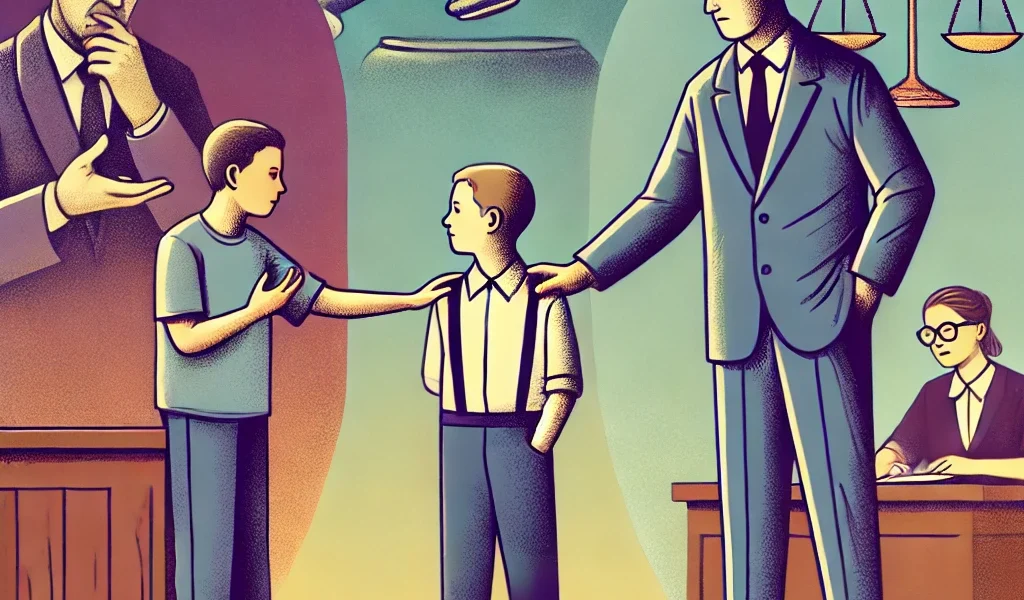Parental alienation is a serious issue that affects many families during and after divorce or separation. It occurs when one parent intentionally or unintentionally influences a child to reject the other parent. This behavior can have long-term emotional and psychological effects on the child, making it essential for the alienated parent to take legal action.
In this blog, we will discuss:
✔ What parental alienation is and how it affects children and parents
✔ The legal remedies available to protect your relationship with your child
✔ How to prove parental alienation in court
✔ Practical steps to regain your child’s trust
By understanding your rights and legal options, you can take steps to protect your bond with your child and ensure their best interests are prioritized.
What is Parental Alienation?
Parental alienation occurs when a child is manipulated by one parent to reject, fear, or disrespect the other parent. This often happens during contentious divorces, custody battles, or in cases where one parent wants to gain full control over the child’s upbringing.
Common signs of parental alienation include:
🚩 Negative speech: The child speaks negatively about the alienated parent without valid reasons.
🚩 Unjustified fear or hostility: The child suddenly refuses to see or communicate with one parent.
🚩 Interference with visitation: One parent makes excuses to limit or block the other parent’s visitation.
🚩 False accusations: The alienating parent falsely accuses the other parent of abuse or neglect.
🚩 Withholding information: The alienating parent does not inform the other parent about the child’s education, medical issues, or important life events.
Effects of Parental Alienation on Children
Parental alienation can severely impact a child’s emotional and mental well-being. Children who are victims of alienation may experience:
💔 Emotional confusion: Feeling pressured to choose between parents causes distress.
💔 Low self-esteem: Constant negativity about a parent affects the child’s self-worth.
💔 Relationship issues: Difficulty trusting others in future relationships.
💔 Depression and anxiety: Increased risk of mental health disorders.
Because parental alienation is harmful to the child, family courts take it very seriously. If you suspect that parental alienation is occurring, you should take legal action immediately.
Legal Remedies for Parental Alienation
There are several legal remedies available to help alienated parents regain their rights and protect their child from further emotional harm.
1. Custody Modification
If parental alienation is proven, the court may modify custody arrangements in favor of the alienated parent.
📌 Sole Custody: If one parent is actively harming the child’s relationship with the other parent, the court may award sole custody to the alienated parent.
📌 Supervised Visitation: The alienating parent may only be allowed supervised visits to prevent further alienation.
📌 Shared Custody Adjustments: The court may order a more balanced custody schedule to allow the alienated parent to rebuild their relationship with the child.
👉 Key Tip: Keep records of any interference with visitation and document any behavioral changes in your child.
2. Court-Ordered Therapy
Family courts may require parents and children to attend therapy or counseling to address parental alienation.
📝 Reunification Therapy: Helps re-establish the child’s bond with the alienated parent.
📝 Co-Parenting Counseling: Educates parents about the harmful effects of alienation and promotes healthy co-parenting.
📝 Child Therapy: Helps the child process their emotions and understand their relationship with both parents.
👉 Key Tip: Request therapy as part of your legal case to ensure professional intervention in the alienation process.
3. Contempt of Court for Violating Custody Orders
If one parent violates custody or visitation orders by preventing the child from seeing the other parent, the alienated parent can file a contempt of court motion.
✅ Legal Consequences for the Alienating Parent:
✔ Fines and penalties
✔ Reduction of custody rights
✔ Potential jail time for severe violations
👉 Key Tip: Always document missed visitations, ignored court orders, and any interference with your parental rights.
4. Parental Alienation as Psychological Abuse
In severe cases, parental alienation may be considered psychological child abuse. Courts can take strong action, including:
❌ Restraining Orders: If the alienating parent’s behavior is harmful, the court can issue an order preventing them from making harmful statements about the other parent.
❌ Guardian ad Litem (GAL) Investigation: The court may appoint a GAL to investigate the situation and advocate for the child’s best interests.
❌ Parental Rights Termination (Extreme Cases): If the alienating parent is found to be emotionally abusing the child, they may lose custody or visitation rights.
👉 Key Tip: If you suspect abuse, report it to child protective services (CPS) or seek legal action immediately.
How to Prove Parental Alienation in Court
To win a parental alienation case, you need strong evidence to show that the other parent is intentionally harming your relationship with your child.
📌 1. Keep Records of Communication
Save emails, text messages, and voicemails that indicate alienation.
📌 2. Document Missed Visitations
Keep track of denied visits and any excuses given.
📌 3. Gather Witness Statements
Family members, teachers, or therapists may provide statements supporting your case.
📌 4. Request a Psychological Evaluation
A child psychologist can assess the emotional impact of alienation on your child.
How to Rebuild Your Relationship with an Alienated Child
Even after taking legal action, rebuilding a damaged relationship with your child takes time and patience. Here are some strategies:
💙 Stay Consistent: Always be there for your child, even if they seem distant.
💙 Avoid Badmouthing the Other Parent: Do not engage in counter-alienation. Focus on positive interactions.
💙 Encourage Open Communication: Allow your child to express their feelings without pressure.
💙 Seek Professional Help: Family therapy can help re-establish trust and connection.
Which Legal Remedy Offers the Best Protection?
The best legal remedy depends on the severity of parental alienation:
✅ For Mild Cases: Court-ordered therapy and mediation can help repair the relationship.
✅ For Moderate Cases: Custody modifications and supervised visitation may be required.
✅ For Severe Cases: Legal action, contempt of court, or even restraining orders may be necessary.
📌 Key Advice: The sooner you take legal action, the better the chances of protecting your relationship with your child.
Conclusion
Parental alienation is a serious issue that requires legal intervention to ensure your child has a healthy relationship with both parents. By understanding your rights and taking the right legal steps, you can protect your bond with your child and prevent further alienation.
👉 If you are experiencing parental alienation, consult with a family law attorney to discuss the best legal strategy for your case.
📢 Disclaimer: This article is for informational purposes only and does not constitute legal advice. Always consult a qualified family law attorney for personalized guidance.




